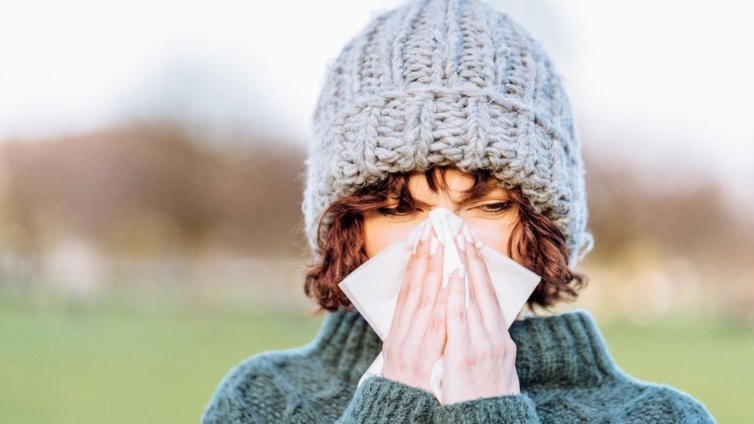The virus that causes the common cold can effectively boot the Covid-19 virus out of the body's cells, say researchers.
Some viruses are known to compete in order to be the one that causes an infection.
And University of Glasgow scientists say it appears cold-causing rhinovirus trumps coronavirus.
The benefits might be short-lived but rhinovirus is so widespread, they add, it could still help to suppress Covid-19.
Think of the cells in your nose, throat and lungs as being like a row of houses. Once a virus gets inside, it can either hold the door open to let in other viruses, or it can nail the door shut and keep its new home to itself.
Influenza is one of the most selfish viruses around, and nearly always infects alone. Others, such as adenoviruses, seem to be more up for a houseshare.
There has been much speculation about how the virus that causes Covid, known as Sars-CoV-2, would fit into the mysterious world of "virus-virus interactions".
The challenge for scientists is that a year of social distancing has slowed the spread of all viruses and made it much harder to study.
The team at the Centre for Virus Research in Glasgow used a replica of the lining of our airways, made out of the same types of cells, and infected it with Sars-CoV-2 and rhinovirus, which is one of the most widespread infections in people, and a cause of the common cold.
If rhinovirus and Sars-CoV-2 were released at the same time, only rhinovirus is successful. If rhinovirus had a 24-hour head start then Sars-CoV-2 does not get a look in. And even when Sars-CoV-2 had 24-hours to get started, rhinovirus boots it out.
"Sars-CoV-2 never takes off, it is heavily inhibited by rhinovirus," Dr Pablo Murcia told BBC News.
He added: "This is absolutely exciting because if you have a high prevalence of rhinovirus, it could stop new Sars-CoV-2 infections."
Similar effects have been seen before. A large rhinovirus outbreak may have delayed the 2009 swine flu pandemic in parts of Europe.
Further experiments showed rhinovirus was triggering an immune response inside the infected cells, which blocked the ability of Sars-CoV-2 to make copies of itself.
When scientists blocked the immune response, then levels of the Covid virus were the same as if rhinovirus was not there.
Latest Stories
-
Contractor storms basic school to drive out students from classroom, claiming government owes him
11 mins -
The quest for peaceful election: religious and traditional leaders should be part of election observers
18 mins -
NDC has better policies to boost economy through agricultural, oil sectors – Ato Forson
20 mins -
Yaw Ampofo Ankrah calls for Kurt Okraku and Executive Council to resign over AFCON failure
31 mins -
Coalition of teachers to boycott December election over unpaid salary arrears
34 mins -
Uphold ethics in fight against fraud – First National Bank CEO
39 mins -
CHRAJ recommends forensic audit of National Cathedral project
40 mins -
I cried every three days at the beginning of my career – Gyakie
43 mins -
#ChoosePeaceGh Campaign: JoyNews partners Catholic Relief Services beyond 2024 December 7 Elections
51 mins -
CHRAJ report scratched the surface on “the double identity” of Rev. Kusi Boateng – Ablakwa
1 hour -
Elections: Akufo-Addo calls for unified front to combat political instability
1 hour -
Alidu Seidu ruled out for the season after suffering raptured ACL
1 hour -
Women advocate for tax waivers, clear timelines for implementation of economic policies
1 hour -
Disinformation, misinformation making our work tedious – NCCE
2 hours -
COP29: Africa expected more in new Climate Finance deal
2 hours

